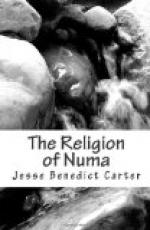not much more radical than in apparently normal times.
And while religion as a whole is conservative, there
is one section of it more conservative than all the
rest, a section from which change is almost excluded,
that is the beliefs concerning the dead. In our
discussion of the religion of Numa we saw the very
primitive character of Roman beliefs in this field,
the firm retention of the old animistic idea of the
dead, the tendency to class the dead together as a
mass and to believe in a collective rather than an
individual immortality, and above all the abhorrence
of the dead and the disinclination to dwell on their
condition and to paint imaginary pictures of life
beyond the grave. In view of these feelings it
is not strange that we have great difficulty in finding
any old Roman gods of the dead, aside from the dead
who are themselves all gods. These dead as gods
(Di Manes) and possibly Mother Earth (Terra
Mater) are the only rulers in the Lower World.
In Greece on the contrary death was almost as natural
as life, and though the conditions in early times were
not unlike those in Rome, as Rohde in his Psyche
has so wonderfully described them, the Greek soon
grew beyond this, and the world of the dead became
almost as well known to him as the world of the living.
There was a kingdom of the dead, and a king and queen
ruled over them. These rulers were called by
different names in different parts of Greece, but
the names which they had in certain parts of the Peloponnesus,
Hades the king of the dead and Persephone his bride,
were destined to survive the rest. The cult of
this royal pair travelled far and wide, but its most
notable development occurred in Attica, where Persephone
became Kore the daughter of Demeter, stolen by Hades
to become his bride, while Hades himself under the
sunny skies of Athens lost some of his terrors and
became Pluto, the god of riches, especially the rich
blessings of the earth. But all this was very
foreign to Rome, and while the Greeks were thinking
these thoughts, the Romans were going quietly along,
content with their simple Di Manes. No
better proof of this can be desired than the one accidentally
given us in the introduction of Demeter and her daughter
Kore into Rome as Ceres and Libera in B.C. 493, and
the absolute colourlessness and pointlessness of Libera,
in a word the entire lack of connexion in the religious
consciousness of Rome between Libera and Persephone.
But in B.C. 249, almost two and a half centuries later,
matters were on a different basis; Rome had been learning
a great deal that was foreign to her old beliefs,
and there was no longer anything impossible to her
in the idea of individual rulers of the dead.
Thus at the command of the books Pluto and Persephone
were received into the state-cult, though the strangeness
of the situation was acknowledged, at least in so far
that they translated Pluto into the Latin Dis; Persephone
to be sure was left alone, or more strictly speaking




